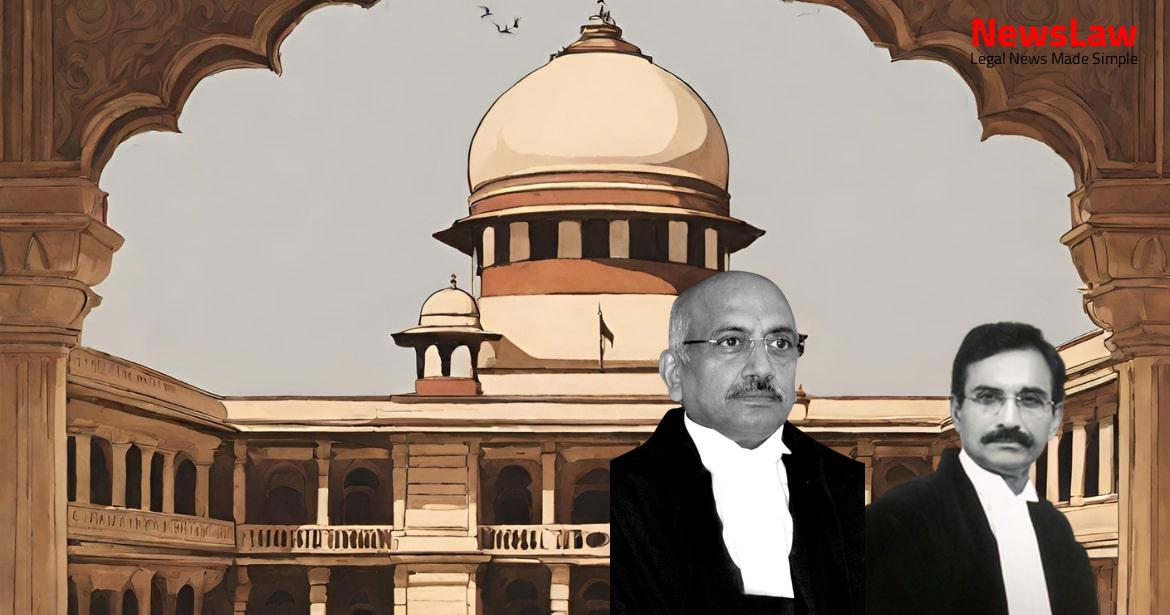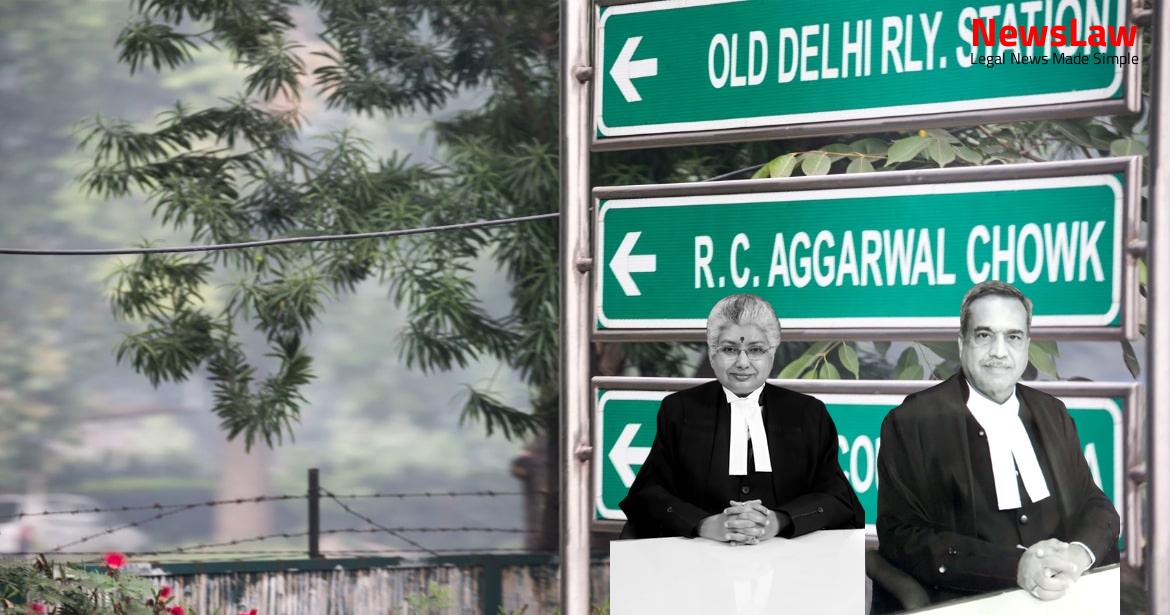In a significant legal battle over the calculation of Premium FSI charges, the Supreme Court of India has delivered a crucial judgment involving Original Name and CMDA. The case revolves around determining the applicable rate for Premium FSI charges concerning a building permission application. Stay tuned to explore the details and outcomes of this landmark decision!
Facts
- The Single Judge dismissed the writ petition, holding the first respondent liable to pay Premium FSI charges based on the guideline value on the date of plan approval.
- Builder’s rights accrue only upon plan approval, not at the application submission stage.
- The Division Bench upheld CMDA’s right to calculate Premium FSI charges as per the guideline value on the date of the application for additional construction approval.
- During the appeal, the first respondent deposited Rs.3,80,00,000 as directed by the Division Bench.
- The Government introduced the Premium FSI Scheme allowing builders to increase FSI by paying extra charges.
- Regulation 36 deals with Premium FSI in relation to road width parameters.
- No undue delay was found on the part of CMDA or the government in processing the first respondent’s application.
- The Division Bench allowed the writ appeal, directing CMDA to calculate Premium FSI charges based on the rate at the time of the first respondent’s application.
- The Appellant, CMDA, rejected the representation by Original Name seeking reduction in Premium FSI Charges.
- Original Name had initially proposed to construct 14,889 sq.mts. of built-up area on 8093.64 sq.mts. of land.
- There was an error in the projected FSI calculation due to human error which led to confusion.
- Original Name applied for additional FSI area under Premium FSI Scheme in May 2011 and submitted revised plans in February 2012.
- Government revised guideline value of land in April 2012 after the submission of the application.
- Government approved Premium FSI on 29.05.2012 for the construction.
- Construction of 196 dwelling units was completed during the pendency of the case.
- Planning permission was granted for construction of multiple blocks with a total area of 14082.26 sq.mt.
- Appellant called upon Original Name to remit Premium FSI Charges based on the revised guideline value of 01.04.2012.
- Appellant calculated Premium FSI Charges at Rs.7,96,50,000 initially, but Original Name raised objections.
- Appellant preferred an appeal against the objections raised by Original Name.
- Government introduced Premium FSI Scheme in 2009 allowing increased FSI upon payment of charges.
- Applicant for Premium FSI charges should pay equivalent to the cost of proportionate land as per Guideline value.
- Original Name, a developer, sought planning permission for a residential-cum-shopping building with 196 dwelling units.
- Appellant granted time till 15.07.2013 to pay Premium FSI charges.
- Original Name filed a writ petition in the Madras High Court after the communication from the appellant.
Also Read: High Court Acquittal Case of State of Uttar Pradesh v. Jai Prakash
Issue
- First respondent submitted an application for construction in 2009 at Padi Village, Chennai.
- Issue at hand is the payment of Premium FSI charges as per the pre-revised guideline value or as per the revised value at the time of application.
- The High Court held that Premium FSI charges are payable as per the pre-revised guideline value as on 04.05.2011, the date of filing the application with revised plan.
- Key point of contention is the interpretation of when the Premium FSI charges should be calculated.
Also Read: Judgment Review: Supreme Court’s Ruling on the Capital Punishment Appeal
Arguments
- The date of application for the revised building plan is crucial for determining the applicable rate for Premium FSI charges.
- Legal right in respect of building plans is acquired only after sanction of the revised plan by the Government.
- The first respondent cannot be burdened with extra charges due to the delay caused by the appellant-CMDA in processing the application.
- Mere submission of an application does not create a legal right until the application is considered and sanction is granted.
- Experienced builders are expected to follow correct procedures for seeking planning permission.
- Application for revised proposal was submitted by First Respondent on 04.05.2011 and returned after nine months on 10.02.2012.
- The delay in processing the application was caused by the appellant, not the First Respondent.
- First Respondent applied for permission under the Premium FSI Scheme and the application was pending consideration with the appellant-CMDA for quite some time.
- Multi-Storeyed Building Panel discussed and forwarded the proposal of First Respondent to the Government with recommendations for approval.
- The Division Bench of the High Court correctly determined that FSI charges are payable on the date of filing the conversion application, not on the date of approval.
Also Read: Compromise Reached: Reddy Satyanarayana vs Narapureddy Sanyasi Rao
Analysis
- The decision in the case of Prestige Estates is not applicable as it pertains to land conversion, not building permission.
- The forwarding of the proposal to the Government with recommendations for approval is standard procedure.
- The application for building permission does not grant any rights until approval is granted by the authorities.
- Premium FSI charges are based on guidelines and require approval from the Government.
- Approval for the revised plan was granted after the revised guideline value came into force on 29.05.2012.
- The date of approval is crucial, and Premium FSI charges should be based on the guideline value at the time of approval.
- No legal right accrues to the builder until the plan is sanctioned by the Government.
- Mere pendency of an application does not create vested rights for the applicant.
- The approval granted on 29.05.2012 determines the Premium FSI charges based on the revised guideline value.
- The first respondent is liable to pay Premium FSI charges based on the guideline value in force at the time of approval on 29.05.2012.
- The Supreme Court held that no right accrues to the builder by mere submission of a plan for construction of a building which has not been sanctioned by the competent authority.
- In Prestige Estates case, the Supreme Court clarified that the demand for Premium FSI charges arises only upon the approval by the Government to avail Premium FSI.
- If building regulations are amended favorably to the builders before sanctioning of building plans, the builders can claim the advantage of the amended regulations.
- The High Court relied on the decision in Union of India v. Mahajan Industries case, which emphasized that the crucial date for calculating conversion charges is the date of receipt of the application for conversion of land use.
- The Division Bench did not rely on the judgement of Union of India and Others v. Dev Raj Gupta and Others (1991) 1 SCC 63 in this particular case.
- The case of Mahajan Industries Limited was also not considered by the Division Bench in reaching their decision.
- The ratio of previous decisions does not apply as they are not relevant to the current case which involves a building permission application, not land conversion.
- The Single Judge criticized the conduct of Original Name in seeking an extension to pay Premium FSI charges and then filing a writ petition against the demand.
- The Division Bench overlooked the principle that an applicant-builder gains no rights solely by applying for approval; the rights arise only upon approval being granted by the authorities.
- It is established that an applicant holds no legal rights until their application is reviewed and approved.
- Regulation 36 specifies that Premium FSI requires government approval in specific areas for any rights to be vested in the applicant.
- The Division Bench’s direction to calculate FSI charges based on the guideline value of 04.05.2011 was incorrect as approval was granted by the Government on 29.05.2012.
- The delays in previous cases deliberated upon were over three years, which is not applicable in the current scenario.
Decision
- The appellant-CMDA rejected the first respondent’s representation to revise Premium FSI charges.
- The appellant-CMDA directed the first respondent to make payment of Premium FSI charges.
- The first respondent requested for an extension of time to remit the Premium FSI charges.
- The first respondent’s application would be returned if payment was not made within sixty days.
- The High Court’s judgment dated 03.08.2016 in W.A. No.2376 of 2013 was set aside through this appeal.
- The first respondent’s further representation dated 14.12.2012 was also rejected.
Case Title: THE CHENNAI METROPOLITAN DEVELOPMENT AUTHORITY REP. BY ITS MEMBER SECRETARY Vs. D. RAJAN DEV .
Case Number: C.A. No.-009336-009336 / 2019



